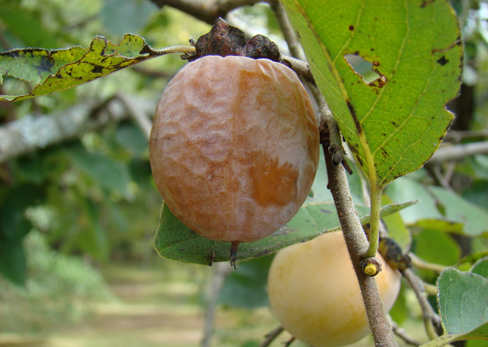Persimmons
The American or common persimmon, Diospyros virginiana, is a slow growing, moderately sized tree native to Kentucky. Fruit are about 1 to 2 inches in diameter. Unripe fruit, which is high in tannins, has a bitter astringent flavor. The golden orange to red fruit are very sweet when fully ripened and astringency is reduced. Cultivated varieties may have improved quality and lose their astringency earlier in the fall.
Marketing
 The Asian persimmon, which is not winter hardy in Kentucky, is more commonly grown commercially in U.S. orchards. There are ongoing efforts to commercialize the American persimmon. These trees are normally sold by nurseries that specialize in less common fruits and nuts. Interest in persimmon and other native fruits has increased with more emphasis on local, regional and “slow” food. Fruit may be marketed fresh, and persimmons are occasionally found at farmers markets across Kentucky. Persimmon can also be processed and the pulp sold as a frozen product. Value-added products include persimmon puddings, cookies, cakes, custards, ice creams, sherbets and preserves. Fruit may also be dried. Producers marketing persimmons at farmers markets and other direct marketing channels should provide persimmon storage, ripening and use information, as many consumers are unfamiliar with the crop.
The Asian persimmon, which is not winter hardy in Kentucky, is more commonly grown commercially in U.S. orchards. There are ongoing efforts to commercialize the American persimmon. These trees are normally sold by nurseries that specialize in less common fruits and nuts. Interest in persimmon and other native fruits has increased with more emphasis on local, regional and “slow” food. Fruit may be marketed fresh, and persimmons are occasionally found at farmers markets across Kentucky. Persimmon can also be processed and the pulp sold as a frozen product. Value-added products include persimmon puddings, cookies, cakes, custards, ice creams, sherbets and preserves. Fruit may also be dried. Producers marketing persimmons at farmers markets and other direct marketing channels should provide persimmon storage, ripening and use information, as many consumers are unfamiliar with the crop.
Production
 Persimmon cultivars vary in fruit color, size, shape and astringency. Earliness and tree size may also differ among varieties. Fruit of most varieties contain black flecks in the pulp, which are not attractive in the processed product. ‘Prok,’ ‘Killen,’ ‘Claypool,’ ‘I-115,’ ‘Dollywood,’ ‘100-42,’ ‘100-43,’ ‘100-45,’ ‘Early Golden,’ ‘John Rick’ and ‘C-100’ are excellent varieties that contain few or no black specks. Persimmons are normally dioecious; that is, trees produce either male or female flowers on separate trees. There is a 90-chromosome American persimmon that is native to the northern U.S. and a 60-chromosome type that is native to Kentucky and the southern U.S. Most of the named varieties are of the 90-chromosome type that set fruit parthenocarpically, without pollination. Thus pollination is not necessary for the 90-chromosome type and fruit are easier to process with few or no seeds.
Persimmon cultivars vary in fruit color, size, shape and astringency. Earliness and tree size may also differ among varieties. Fruit of most varieties contain black flecks in the pulp, which are not attractive in the processed product. ‘Prok,’ ‘Killen,’ ‘Claypool,’ ‘I-115,’ ‘Dollywood,’ ‘100-42,’ ‘100-43,’ ‘100-45,’ ‘Early Golden,’ ‘John Rick’ and ‘C-100’ are excellent varieties that contain few or no black specks. Persimmons are normally dioecious; that is, trees produce either male or female flowers on separate trees. There is a 90-chromosome American persimmon that is native to the northern U.S. and a 60-chromosome type that is native to Kentucky and the southern U.S. Most of the named varieties are of the 90-chromosome type that set fruit parthenocarpically, without pollination. Thus pollination is not necessary for the 90-chromosome type and fruit are easier to process with few or no seeds.

